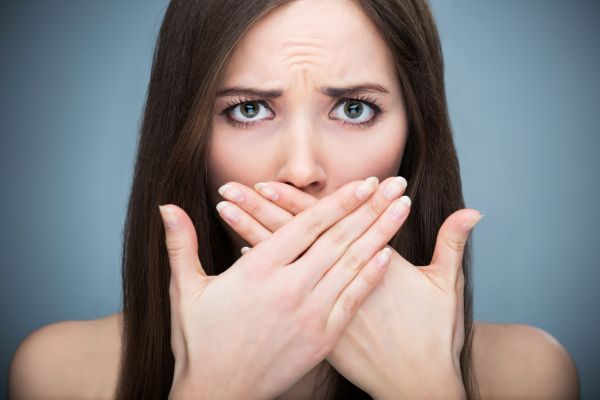Halitosis. Bad breath. Morning breath. No matter what it is called, the condition is marked by a foul stench being omitted by the oral cavity. The condition helps fuel a multi-billion dollar industry of mouthwashes, toothpastes, chewing gum and mints, but ultimately flossing is the best way for an individual to combat condition on their own.
Estimates suggest that between 35 to 45 percent of the world’s entire population has chronic bad breath. While some of those cases can be indicators of a bigger dental problem such as tooth decay and tooth erosion, many of the cases can easily be cured with excellent dental care. Removing excess dental plaque and bacteria daily with dental floss is the essential part of the equation.
About Bad Breath
Dentistry.com defines bad breath as being “…a biological reaction characterized by the release of volatile sulfur into the atmosphere. Bad breath may also contain hydrogen sulfide and methyl marcaptan,” compounds not known for having a pleasant smell. Chronic bad breath is when that condition never goes away and many times, poor dental hygiene is the cause for the condition.
Certain foods (like onions and garlic) and behaviors (including smoking and drinking) have long been associated with causing dragon’s breath. In these cases of halitosis, remedies such as mouth rinsing and stopping the bad behavior can do wonders to freshen breath. However, for individuals suffering from chronic bad breath, the best solution is practicing good oral hygiene and including flossing in the ritual.
Dental Floss to the Rescue
Dental flossing is a must for removing trace elements of food and dental plaque that end up in between teeth. The process of eating will cause simple sugars to be left behind on teeth plus sometimes tiny pieces of food can end up wedged in between the devices. While the human eye may not easily see the deposits, oral bacteria will sense the feast, latch onto those sugars and then conduct their work of breaking them down. As they do, they will release an acid as a byproduct of their digestion process and that offshoot is what triggers off dental problems including chronic bad breath.
Although brushing twice a day is an important step for helping control the development of dental plaque, flossing is essential for finishing up the job. Some experts suggest that brushing is like cleaning about 70 percent of teeth while leaving the other 30 percent filthy. It is because of that imbalance that dentists stress the importance of flossing to erase bad breath.
Masking the Scent May Make Matters Worse
Unfortunately, many people skip their dental hygiene practices because they are short on time. As a result, they may opt to consuming chewing gum, mints or even opt for a quick swish of mouthwash to rectify the behavior. Those devices will only temporarily mask the foul scent and can eventually make the problem worse.
Some of those dental care products are filled with both sugars and alcohol, the two culprits known for feeding oral bacteria. While the artificial mint scent may briefly cover the stench, the products may ultimately leave trace elements of sugars behind, once again fueling an oral bacteria-feeding frenzy.
Those suffering from chronic bad breath can first try to combat the issue affordable at home by instituting the daily preventative dentistry practice of brushing twice a day and flossing once daily to remove the high levels of dental plaque associated with the condition. Some dentist recommended tips to get the most out of the practice include:
- Floss at night after brushing and before bedtime.
- Follow up flossing sessions by rinsing with clean, fresh water.
- Use 18″ of floss per session to allow for enough floss so a fresh piece can be used for every tooth space.
- Flossing is a two handed job. Individuals should wrap about six inches of floss around their middle finger, using the thumb to keep it in place. Once in that position, the floss should be held and straighten by manipulating both the thumb and pointer finger of the opposite hand.
- The thread should be gently maneuvered both back and forth between teeth and slowly moved from the gum line up the sides of teeth to remove the greatest amount of plaque possible.
If despite your best flossing and dental hygiene efforts, your mouth still smells as if a baby squirrel has died inside, then getting a professional dental exam from a dentist is a must. During this process a dentist will have a dental hygienist professionally remove any dental plaque or tartar deposited on teeth. Aside from a great cleaning, a dentist will also X-ray a mouth and provide a thorough, physical examination to check for the medical reasons for chronic bad breath including cavities, gum disease, yeast infections or dry mouth. Only after the true cause of the issue has been determined will a dentist recommend any other dental treatments to combat the issue.

